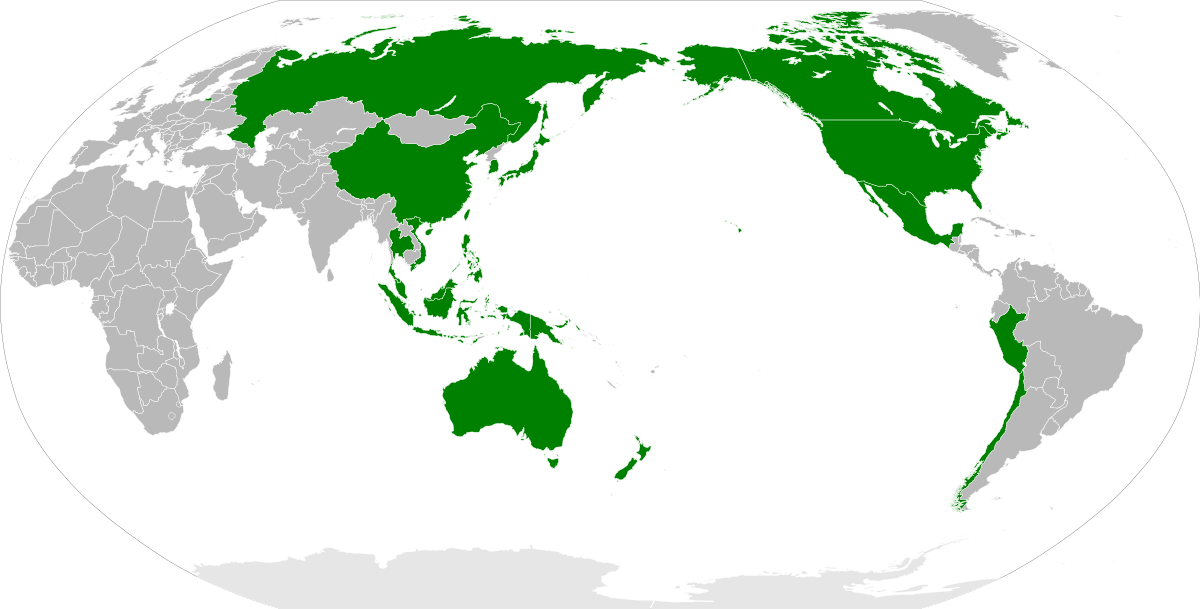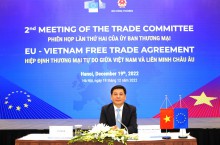The News
Business group: APEP could offer pathway for countries to join USMCA
The Biden administration should form a public-private mechanism focused on bolstering supply chain resilience that could allow countries participating in the Americas Partnership for Economic Prosperity to accede to the U.S.-Mexico-Canada Agreement, the Council of the Americas said this week. In an Oct. 18 letter to President Biden, which the Council of the Americas shared with Inside U.S. Trade, President and CEO Susan Segal and Vice President Eric Farnsworth applaud the administration’s newfound engagement with countries in the Western Hemisphere and outline several recommendations for the administration to consider as it develops the partnership.
The Biden administration should form a public-private mechanism focused on bolstering supply chain resilience that could allow countries participating in the Americas Partnership for Economic Prosperity to accede to the U.S.-Mexico-Canada Agreement, the Council of the Americas said this week. In an Oct. 18 letter to President Biden, which the Council of the Americas shared with Inside U.S. Trade, President and CEO Susan Segal and Vice President Eric Farnsworth applaud the administration’s newfound engagement with countries in the Western Hemisphere and outline several recommendations for the administration to consider as it develops the partnership.
The Biden administration should form a public-private mechanism focused on bolstering supply chain resilience that could allow countries participating in the Americas Partnership for Economic Prosperity to accede to the U.S.-Mexico-Canada Agreement, the Council of the Americas said this week.

The Council of the Americas is a Western Hemisphere-focused business organization whose members are international companies that represent sectors including energy, mining, manufacturing, technology and more, according to its website.
In an Oct. 18 letter to President Biden, which the Council of the Americas shared with Inside U.S. Trade, President and CEO Susan Segal and Vice President Eric Farnsworth applaud the administration’s newfound engagement with countries in the Western Hemisphere and outline several recommendations for the administration to consider as it develops the partnership.
APEP’s five pillars will cover supply chain resilience, “mobilizing investment,” tax and anti-corruption measures, decarbonization and “ensuring sustainable and inclusive trade,” according to a June White House fact sheet. Biden announced the partnership in June, but few details – including which countries will participate in negotiations – have since been released.
To assist APEP’s supply chain pillar, the council recommends that the U.S. adopt a “standing public-private mechanism on supply chain resilience” aimed at helping regional governments benefit from and develop “comprehensive and diversified regional supply chains.”
As part of that effort, the group suggests the U.S. consider expanding USMCA to include Dominican Republic-Central America Free Trade Agreement partners, and others.
“This mechanism should highlight provisions in current agreements that might extend to other regional members (for example, establishing a mechanism leading to USMCA ascension for DR-CAFTA and potentially other free trade partners countries who are ready, willing, and appropriate to join,)” the letter states. CAFTA-DR includes the U.S. and six other countries. The U.S. also has FTAs with several Latin American countries.
Farnsworth made a similar recommendation in June when he told Inside U.S. Trade that the U.S. could strengthen Western Hemisphere supply chains by folding other countries into USMCA. “There'll be no quicker way to get investment into countries to help integrate them into the North American supply chain than to integrate them into USMCA,” he said at the time.
In May, Sen. Tim Kaine (D-VA), chair of the Senate Foreign Relations subcommittee on Western Hemisphere issues, suggested the U.S. could expand USMCA to include other countries in the region.
For APEP’s clean energy pillar, the letter recommends the Biden administration explore a “clean technology free trade agreement” with APEP participants to “promote innovation, green jobs, and environmental protection.”
“The agreement should include products that improve environmental quality (for example, air pollution control, energy efficiency, water and wastewater treatment, solid and hazardous waste treatment and environmental monitoring and analysis), renewable and clean energy technologies, and inputs critical to the clean energy transition (for example, lithium and copper),” the letter states.
As part of APEP’s pillar on ensuring sustainable inclusive trade, the letter recommends that the U.S. “commit to accelerated and effective implementation” of the World Trade Organization’s Trade Facilitation Agreement.
“TFA implementation in the region has been uneven to date, with some countries still planning for final implementation by 2038,” the letter states. “As part of such a commitment, the United States and multilateral banks should commit to increased funding for APEP partners that seek to build the capacities necessary to meet TFA commitments.”
Wider implementation, it adds, will “enhance regional competitiveness and support inclusion of [small and medium-sized enterprises] in global value chains by reducing timing costs for import and export.”
When the Biden administration in May formally launched the Indo-Pacific Economic Framework for Prosperity, U.S. Trade Representative Katherine Tai said talks on trade facilitation among IPEF members would include efforts to speed up TFA implementation among IPEF parties.
TFA entered into force in February 2017.
Jason Asenso (jasenso@iwpnews.com )



